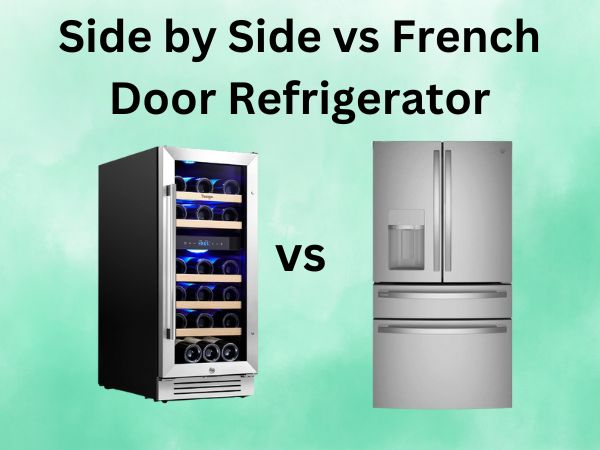42 vs 48 Inch Refrigerator: Which One Should You Choose?
In the world of home appliances, the refrigerator is undoubtedly one of the most essential and versatile pieces of equipment. It’s the workhorse of the kitchen, keeping our food fresh and our drinks chilled. But when it comes to choosing the right refrigerator size, the decision can be a bit daunting. Should you go for a 42-inch model or a slightly larger 48-inch option? Let’s explore the pros and cons of each to help you make an informed decision that suits your needs.
Table of Contents
Factors to Consider
Before we dive into the specifics of 42-inch and 48-inch refrigerators, it’s essential to consider a few key factors that will help guide your decision-making process.
Kitchen Space
The first and most important factor to consider is the available space in your kitchen. Measure the area where you plan to install the refrigerator, taking into account any surrounding cabinets or countertops. This will help you determine the maximum size that will fit comfortably without overcrowding the space.
Household Size
Another crucial factor is the size of your household. If you have a large family or entertain guests frequently, a 48-inch refrigerator may be the better choice to accommodate your food storage needs. Conversely, if you live alone or have a smaller household, a 42-inch model might be more suitable.
Capacity and Organization
The internal capacity and organizational features of the refrigerator are also important considerations. Both 42-inch and 48-inch models come with a variety of shelving, drawers, and storage options, but the larger 48-inch model will generally offer more overall capacity and flexibility.
42-Inch Refrigerator: The Compact Option
The 42-inch refrigerator is a popular choice for those with limited kitchen space or smaller households. Its compact size makes it an excellent fit for apartments, condos, or even galley-style kitchens. Here are some of the key advantages of the 42-inch model:
- Space-Saving Design: The 42-inch refrigerator takes up less floor space, allowing you to utilize your kitchen more efficiently and potentially free up valuable counter or cabinet space.
- Energy Efficiency: Smaller refrigerators generally consume less energy, which can translate to lower utility bills and a more eco-friendly footprint.
- Accessibility: The compact size of a 42-inch refrigerator can make it easier to reach and access the contents, especially for shorter individuals or those with mobility challenges.
Of course, the trade-off with the 42-inch model is that it may not offer as much storage capacity as its larger counterpart. If you have a large family or entertain frequently, the 42-inch refrigerator may not be able to accommodate all your food and beverage needs.
48-Inch Refrigerator: The Spacious Option
The 48-inch refrigerator is a popular choice for those with ample kitchen space and a need for greater storage capacity. Here’s a closer look at the benefits of the 48-inch model:
- Increased Capacity: The extra 6 inches of width in a 48-inch refrigerator translates to significantly more storage space, allowing you to stock up on groceries and accommodate larger items with ease.
- Versatile Shelving: 48-inch refrigerators often come with more adjustable shelves, drawers, and organizational features, making it easier to customize the interior layout to suit your needs.
- Suitability for Larger Households: If you have a big family or entertain frequently, the 48-inch refrigerator can provide the capacity and flexibility to keep up with your food storage demands.
The main drawback of the 48-inch refrigerator is its larger size, which may not fit in all kitchens. It’s essential to measure your available space carefully to ensure the 48-inch model will fit comfortably without overcrowding the room.
Conclusion
Choosing between a 42-inch and 48-inch refrigerator ultimately comes down to a balance of your kitchen space, household size, and storage needs. The 42-inch model is an excellent choice for those with limited space or smaller households, while the 48-inch refrigerator offers greater capacity and versatility for larger families or frequent entertainers.
Ultimately, the decision is yours to make, but be sure to carefully consider the factors mentioned in this article to ensure you select the refrigerator that will best meet your needs and fit seamlessly into your kitchen. Happy shopping!
FAQs
What is the standard depth of a 42-inch and 48-inch refrigerator?
The standard depth for both 42-inch and 48-inch refrigerators is typically around 30 inches. However, it’s important to measure your available space carefully, as some models may have a slightly different depth.
Can a 48-inch refrigerator fit in a standard kitchen?
In most cases, a 48-inch refrigerator can fit in a standard kitchen, but it’s crucial to measure the available space and ensure it will not overcrowd the room. Some kitchens may be better suited for a 42-inch model, depending on the layout and surrounding cabinetry.
What is the difference in capacity between a 42-inch and 48-inch refrigerator?
The capacity difference between a 42-inch and 48-inch refrigerator can vary, but generally, the 48-inch model will offer significantly more storage space. The exact capacity difference will depend on the specific models and features, but you can expect the 48-inch refrigerator to provide an additional 3-5 cubic feet of usable interior space.
How much more energy does a 48-inch refrigerator consume compared to a 42-inch model?
The energy consumption of a refrigerator is influenced by a variety of factors, including the size, efficiency, and features of the appliance. As a general rule, the larger 48-inch refrigerator will use more energy than the 42-inch model. However, modern energy-efficient models can help minimize the difference, and it’s essential to compare the energy ratings of specific refrigerator models to make an informed decision.
Can I install a 48-inch refrigerator in a 42-inch space?
It is generally not recommended to install a 48-inch refrigerator in a 42-inch space. The larger refrigerator will not fit properly and may cause issues with the surrounding cabinetry or countertops. It’s crucial to carefully measure your available space and choose a refrigerator size that will fit comfortably without any modifications to your kitchen layout.



